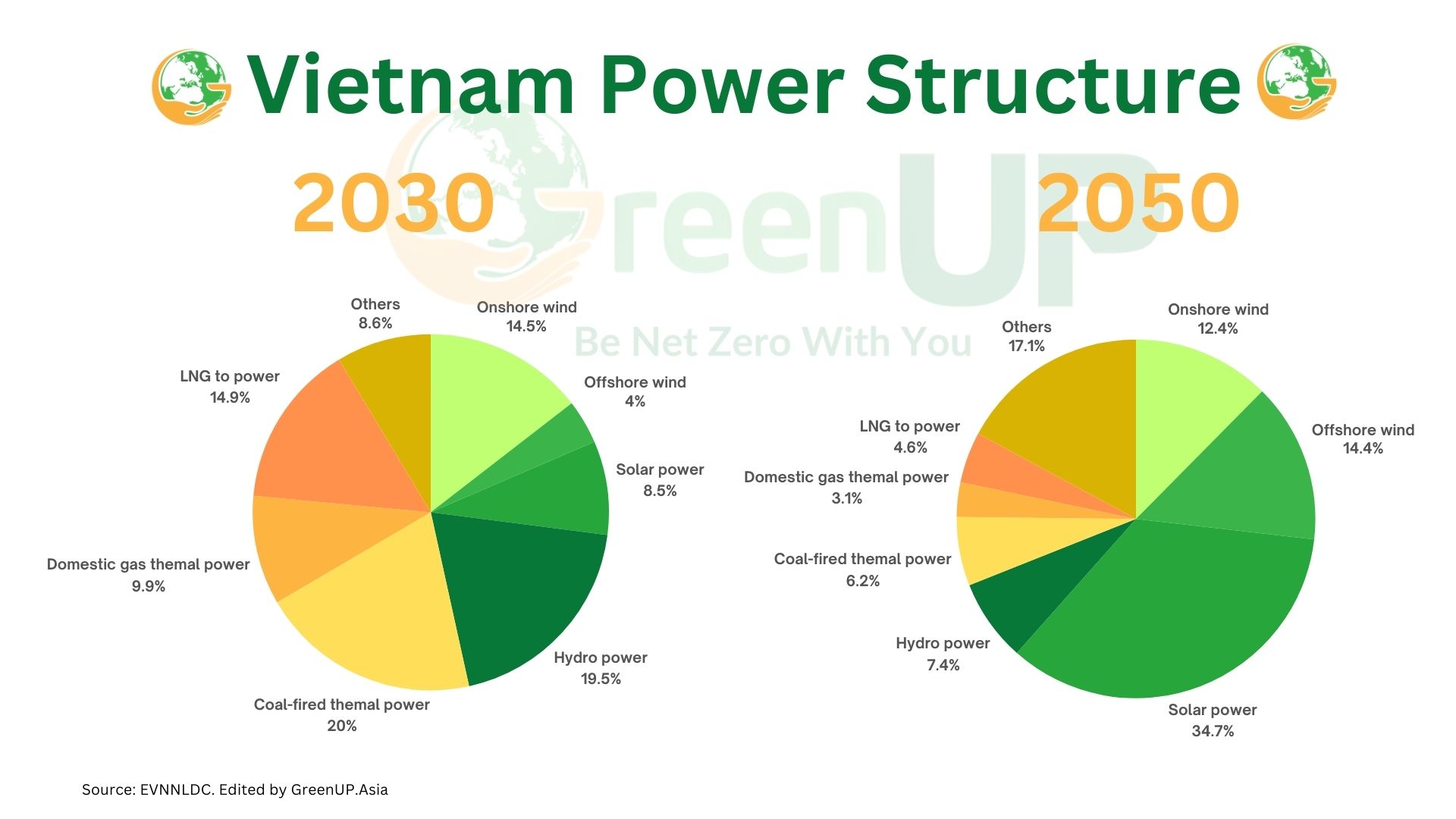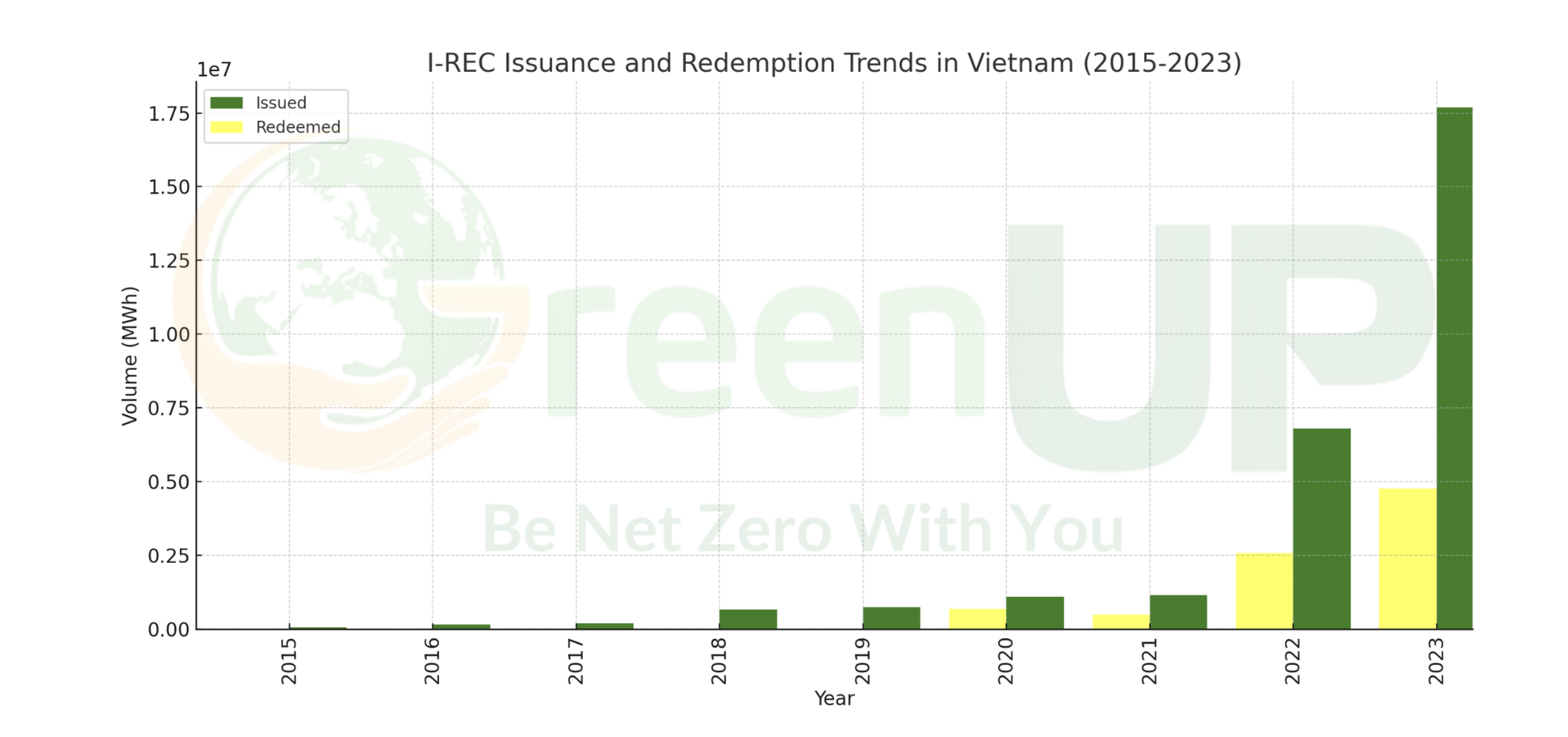Historical Overview of the I-REC Market in Vietnam
The International Renewable Energy Certificate (I-REC) market in Vietnam has seen significant growth since its inception. Initially introduced as a mechanism to track and trade renewable energy consumption, the market began to gain traction around the early 2010s, coinciding with global trends towards sustainability. One of the early milestones was the successful issuance of the first batch of I-RECs, which marked Vietnam as a player in the global green energy market. Learn more about I-REC in our different article here.
The Growth
Several factors have contributed to the burgeoning I-REC market in Vietnam, including:
- Government Incentives and Support: The Vietnamese government has played a crucial role by implementing policies that encourage renewable energy development. Initiatives such as feed-in tariffs, tax incentives, and direct subsidies have made investments in renewable energy projects more viable and attractive.
- Technological Advancements: As technology in solar and wind energy has advanced, the costs associated with these renewable sources have decreased. This reduction in cost has made renewable energy projects more competitive and financially feasible, encouraging more producers to enter the I-REC market.
- Corporate Social Responsibility (CSR) and Environmental, Social, and Governance (ESG) Goals: There’s a growing trend among corporations in Vietnam to meet CSR and ESG targets, which often include reducing carbon footprints and supporting sustainable practices. I-RECs serve as a tool for these companies to prove their use of renewable energy, thereby fulfilling their sustainability goals.
- International Collaboration and Funding: The I-REC market in Vietnam has also benefited from international partnerships and green financing options, which have provided the necessary capital for large-scale renewable projects capable of generating significant amounts of I-RECs.

Market Dynamics and Trends
As renewable energy production in Vietnam has expanded, so has the volume of I-RECs issued:
- Increase in Renewable Energy Production: The total capacity of renewable energy in Vietnam has grown exponentially, with solar and wind energy leading the expansion. This increase in renewable energy generation directly translates into a higher availability of I-RECs.
- Shifts in Consumer and Investor Sentiment: The perception of renewable energy has shifted dramatically, with both consumers and investors increasingly favoring green energy options. This shift has increased demand for I-RECs as a transparent mechanism to ensure that energy consumed is sustainably sourced.
- Emergence of New Market Participants: New entrants, including foreign investors and innovative local startups, have energized the market. These participants often bring new approaches and technologies, further stimulating market growth and competitiveness.
According to the latest statistics from The International Tracking Standard Foundation (founder of I-REC), the data about I-REC issuance and redemption in Vietnam reveals some interesting trends and insights into the renewable energy certificate market from 2015 to 2023:
Gradual Increase and Subsequent Surge in Issuance:
- From 2015 to 2019, there was a gradual increase in the issuance of I-RECs, indicating a steadily growing interest in renewable energy projects and their certification.
- A more notable increase is observed from 2020 onwards, with a significant surge, particularly in 2022 and 2023. In 2023 alone, the volume of issued I-RECs reached approximately 17.69 million MWh, which is more than twice the volume issued in 2022.
Emergence of Redemption Trends:
- Redemption data starts from 2020, suggesting that the market for redeeming I-RECs in Vietnam might have become active or significantly tracked only around this time.
- Since 2020, the redemption volume has also shown a rapid increase. The year 2023 saw a peak in redemptions at around 4.77 million MWh, reflecting an increased commitment from companies and entities to offset their carbon emissions by supporting renewable energy.
Implications of Market Dynamics:
- The sharp increase in both issuance and redemption from 2022 could be linked to a combination of factors such as increased renewable energy capacity, regulatory changes, enhanced corporate sustainability targets, and growing global awareness about the importance of carbon offset mechanisms.
- The increasing redemption rates suggest that more organizations are utilizing these certificates to claim their renewable energy usage and meet their sustainability or regulatory requirements.

A Diverse Set of Stakeholders
The growth of the I-REC market in Vietnam is supported by a diverse set of stakeholders:
- Utilities and Renewable Energy Companies: Major energy producers have been crucial in generating the renewable energy that backs I-RECs. Their ongoing expansion into renewable projects continues to feed the market with new I-RECs.
- Intermediaries and Aggregators: These entities play a pivotal role by linking renewable energy producers with companies and organizations that seek to green their energy consumption. They help in aggregating I-RECs from smaller producers, making it easier for large buyers to meet their energy needs sustainably.
- Contribution of major players: For example, as a leader in the I-REC market in Vietnam, GreenUP has issued over 10 million I-RECs since 2022, dramatically influencing the market landscape. Through strategic partnerships and a strong market presence, GreenUP not only facilitates the availability of I-RECs but also ensures competitive pricing and reliability in the market.
Challenges and Opportunities
Challenges
While the I-REC market in Vietnam is growing, it faces several significant challenges that could affect its sustainability and expansion:
- Regulatory and Policy Hurdles: Despite supportive government policies, inconsistencies and changes in regulations can pose risks to long-term investments. The lack of clarity in some policy areas, especially concerning the verification and tracking of renewable energy, can hinder market confidence and growth.
- Market Volatility and Pricing Issues: The I-REC market is susceptible to price fluctuations due to varying supply and demand dynamics. This volatility can deter potential new entrants who are wary of unpredictable returns on investment.
- Verification and Auditing Challenges: Ensuring that renewable energy claims are legitimate and verifiable poses a significant challenge. The process for verifying and auditing energy sources needs to be robust to prevent fraud and ensure that I-RECs genuinely represent renewable energy production.
Opportunities
Despite these challenges, there are substantial opportunities for growth and innovation within the I-REC market in Vietnam:
- Growing International Interest in Carbon Credits and Renewable Certificates: As global awareness and commitments to reducing carbon footprints increase, the demand for mechanisms like I-RECs is expected to rise. This international interest can attract more investment into Vietnam’s renewable energy sector.
- Potential for Technology Integration: The integration of new technologies such as blockchain could enhance the transparency and efficiency of the I-REC market. Blockchain technology can help in tracking energy production and I-REC issuance in real-time, providing a more reliable and fraud-resistant framework.
- Expansion of Renewable Energy Sources: Vietnam has considerable potential to expand its renewable energy sources beyond solar and wind, including biomass and hydropower. This expansion would increase the production of I-RECs, helping to meet both domestic and international demand.
- Development of a Regional Hub for Green Energy: Vietnam could leverage its growing expertise and capabilities in renewable energy to become a regional hub for green energy. This could facilitate regional trade in I-RECs and establish Vietnam as a leader in renewable energy certification in Southeast Asia.
Addressing these challenges and capitalizing on these opportunities requires coordinated efforts among various stakeholders, including government bodies, energy producers, and market facilitators. By fostering an environment that supports stable policies, technological innovation, and international collaboration, Vietnam can enhance its I-REC market’s robustness and contribution to global sustainability goals.
The Future of I-RECs in Vietnam
As Vietnam continues to advance its renewable energy capabilities, the future of the I-REC market looks promising yet requires strategic navigation. Several factors will play critical roles in shaping this future:
- Government Policies and Market Support: Continued support and clear, stable policies from the Vietnamese government will be essential for sustaining and accelerating the growth of the I-REC market. This includes refined regulations that support market transparency and fairness.
- Technological Advancements: The adoption of cutting-edge technologies such as blockchain for tracking and trading I-RECs can ensure greater transparency and efficiency in the market. This technology can also help mitigate challenges related to verification and auditing.
- Increased Foreign Investment: As global investors seek greener portfolios, Vietnam’s growing reputation as a renewable energy leader can attract more foreign investment, which in turn would boost the I-REC market.
- Educational and Awareness Programs: Increasing awareness about the benefits of I-RECs among corporations and the general public will be vital. Educational initiatives can help more businesses understand how I-RECs can be used to achieve their sustainability goals.
- Regional Cooperation: Enhancing cooperation with other Southeast Asian nations could help standardize and expand the I-REC market across the region, making it more robust and interconnected.
As Vietnam continues to navigate its green energy transition, the I-REC market will undoubtedly play a crucial role in shaping the country’s energy future. Stakeholders must therefore remain proactive, continually adapting to the evolving market landscape while striving to achieve both national and global sustainability objectives. With thoughtful strategies and collaborative efforts, the future of I-RECs in Vietnam is essential to the nation’s commitment to a greener planet.
About GreenUP
Pioneering the Green Transition with Expertise and Innovation. With over 10 million I-RECs issued since 2019, we are Vietnam’s leaders in renewable energy certification. Our comprehensive suite of services, positions us uniquely as a one-stop solution for all your green and ESG needs. Experience unparalleled market access, competitive pricing, and strategic partnerships that drive not only cost savings but also significant value to your sustainability goals.
References
- EEC Vietnam (no date) International Renewable Energy Certificates (I-REC): New source of finance for renewable energy projects in Vietnam. Available at: https://eec.vn/en/international-renewable-energy-certificates-i-rec-new-source-of-finance-for-renewable-energy-projects-in-vietnam/.
- ECOHZ (no date) RMM 2023: Key learnings for the renewable energy market. Available at: https://www.ecohz.com/blog/rmm-2023-key-learnings-for-the-renewable-energy-market.
- TrackingStandard (no date) Available at: https://www.trackingstandard.org/6559-2/.
- McKinsey & Company (no date) Putting renewable energy within reach: Vietnam’s high stakes pivot. Available at: https://www.mckinsey.com/industries/electric-power-and-natural-gas/our-insights/putting-renewable-energy-within-reach-vietnams-high-stakes-pivot.
- S&P Global Commodity Insights (no date) I-RECs (International Renewable Energy Certificates) Methodology. Available at: https://www.spglobal.com/commodityinsights/PlattsContent/_assets/_files/en/our-methodology/methodology-specifications/i-recs-international-renewable-energy-certificates-methodology.pdf.
- USAID V-LEEP II (2022) REC VEPG Presentation. Available at: https://vepg.vn/wp-content/uploads/2022/12/5.-EN_USAID-V-LEEP-II-REC-VEPG-Presentation_2022.11.25_Formatted.pdf .







